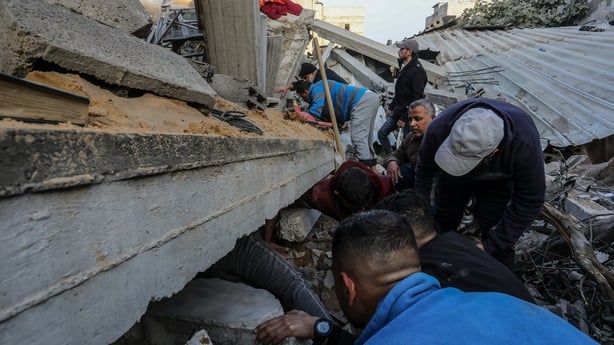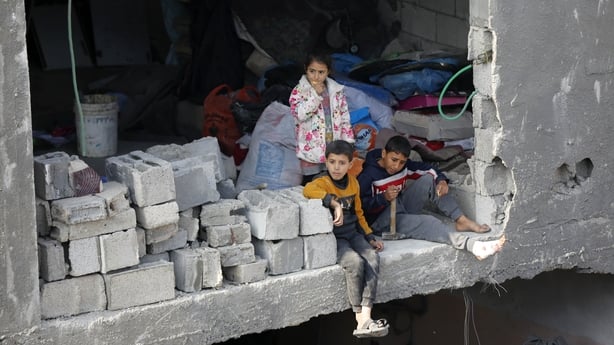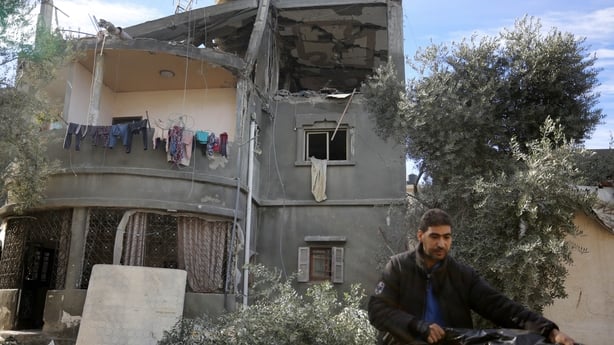The United States has said it will continue to arm Israel in its campaign against Hamas, even as it called for more humanitarian aid to Palestinians in Gaza.
Fighting is raging in the third month of the bloodiest war, with the territory's health ministry reporting another 110 people killed in strikes on the Jabalia camp near Gaza City.
A vote at the United Nations Security Council in New York on another call for a ceasefire has been postponed until tomorrow.
Previous bids were vetoed by the US - Israel's key ally.
Visiting Israel, US Secretary of Defense Lloyd Austin said: "We must get more humanitarian assistance in to the nearly two million displaced people in Gaza and we must distribute that aid better."
But he confirmed that Washington was "Israel's greatest friend" and would continue to provide "critical munitions, tactical vehicles and air defence systems".
He added that his visit did not aim to "dictate timelines or terms" for the war.
Mr Austin is touring the Middle East as concerns grow over the war's spread around the region, with Iran-backed Huthi rebels in Yemen attacking international shipping in the Red Sea in solidarity with Hamas.
The action has disrupted global trade, driving up oil prices, with energy giant BP among the latest major firms to stop using the vital route that leads to the Suez Canal.
We need your consent to load this rte-player contentWe use rte-player to manage extra content that can set cookies on your device and collect data about your activity. Please review their details and accept them to load the content.Manage Preferences
"In the Red Sea, we're leading a multinational maritime taskforce to uphold the bedrock principle of freedom of navigation," Mr Austin said, warning Iran to stop supporting the Huthi attacks.
The war in Gaza began when its Hamas rulers launched an unprecedented attack on 7 October, killing around 1,140 people in Israel, mostly civilians, and abducting 250, according to official Israeli figures.
Gaza's health ministry says Israel's military response has resulted in the deaths of more than 19,400 people, mostly women and children, while reducing vast areas to rubble.
'Starvation a method of warfare' - Human Rights Watch
International alarm has mounted over the plight of 2.4 million Gazans enduring daily bombardment, food and water shortages and mass displacement.
Human Rights Watch (HRW) said that Israel "is using starvation of civilians as a method of warfare".
"Israeli forces are deliberately blocking the delivery of water, food and fuel, while wilfully impeding humanitarian assistance, apparently razing agricultural areas," the non-governmental organisation said.
Israel responded that HRW was an "anti-Semitic and anti-Israeli organisation".
"Human Rights Watch ... did not condemn the attack on Israeli citizens and the massacre of October 7 and has no moral basis to talk about what's going on in Gaza," a foreign ministry spokesman said.

Earlier, head of the UN agency for Palestinian refugees Philippe Lazzarini said that he "would not be surprised if people start dying of hunger, or a combination of hunger, disease, weak immunity".
Israel has approved aid deliveries into Gaza via its Kerem Shalom crossing, aside from the Rafah crossing with Egypt, and dozens of trucks were seen entering through Kerem Shalom today.
At the Rafah crossing, many families gathered in the hopes of finally being allowed across to safety.
"We've been here for about a month," said Safa Fathi Hamad. "We are going to die, food is very limited and we have no protection."
Hamas insists no hostage exchange until Israel ends war
Israel's Prime Minister Benjamin Netanyahu has vowed that Israel will destroy Hamas, free the hostages and ensure that Gaza will never again become "a centre for terrorism".
But Hamas official Osama Hamdan has reiterated the group's position that any negotiations on a hostage exchange are off the table until the war is stopped.
"We are open to initiatives from Qatar and Egypt about a hostage exchange that would stop the war in Gaza", Mr Hamdan added at a news conference in Beirut.
Hamas' armed wing posted a video message via its Telegram account showing three elderly Israeli detainees sitting on chairs in an undisclosed location.
One of them is seen asking Israeli authorities to work towards their release.

The Israeli army has reported 129 deaths in the territory since it launched ground operations in late October.
Israel has accused Hamas of hiding among civilians and in tunnels underneath hospitals, schools, mosques and other civilian infrastructure.
The army released a report yesterday of part of a vast Hamas tunnel network, big enough to drive vehicles through, featuring rails, power lines, drainage systems and a communications network.
Israel has faced mounting global pressure to either slow, suspend or stop hostilities.
Families of the remaining 129 hostages believed held in Gaza are among those making the call, with their anger and fear intensifying after Israeli forces mistakenly shot dead three hostages who had escaped their captors.
The trio waved white flags and used food leftovers to write a Hebrew-language message on a white sheet before they were shot, reports said.

Army chief of staff Herzi Halevi, in a message to troops, stressed that if enemy fighters "lay down their arms and raise their hands, we capture them, we don't shoot them".
Qatar, which helped mediate a week-long truce and hostage-prisoner exchange last month, said there are "ongoing diplomatic efforts to renew the humanitarian pause".
US news platform Axios reported that Mossad chief David Barnea, CIA director Bill Burns and Qatari Prime Minister Sheikh Mohammed bin Abdulrahman Al Thani met in the Polish capital Warsaw.
As the war rages on, special concern has focused on hospitals, most of which no longer function, and several of which have been the scenes of major fighting.
World Health Organization chief Tedros Adhanom Ghebreyesus said the UN agency was "appalled by the effective destruction" of northern Gaza's Kamal Adwan hospital.
Outside the hospital, the muddy ground scarred by tank and bulldozer tracks, Abu Mohammed stood crying as he searched for his son.
"I don't know how I will find him," he said, pointing to the debris.
Read full coverage of the Israel-Hamas conflict

